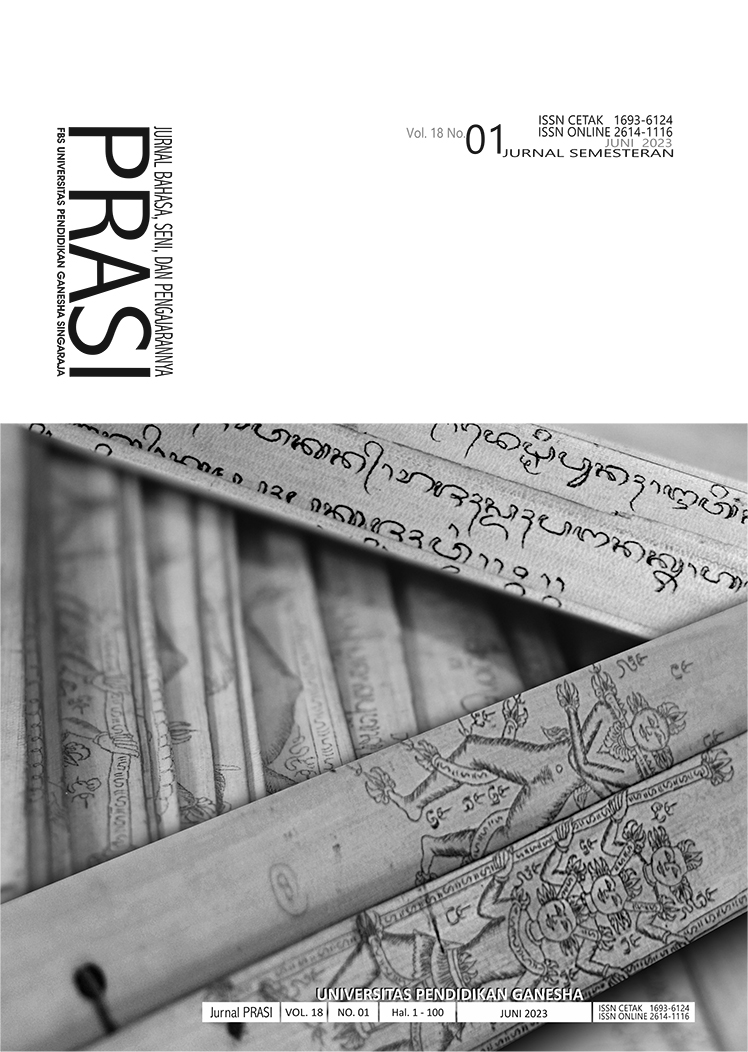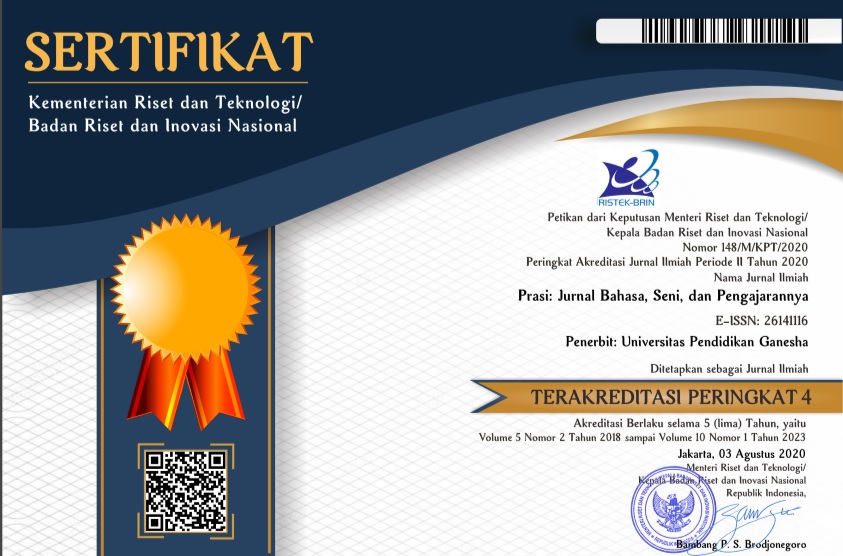PENERAPAN METODE INKUIRI DALAM PEMILIHAN TOPIK TULISAN AKADEMIK
DOI:
https://doi.org/10.23887/prasi.v18i01.60389Keywords:
Inkuiri, topik penelitian, pemilihan topik, pembelajaranAbstract
The aim of this research is to explain the procedure for applying the inquiry method in the research topic selection process and to present students' perceptions of inquiry-based learning in research topic selection. The method used is classroom action research. The research data source is 24 seventh-semester students of D4 Civil Engineering at the State Polytechnic of Malang. The research instruments are observation guidelines and a questionnaire on student responses. The results show that (1) the inquiry learning procedure on research topic selection material has six stages: orientation, problem formulation, hypothesis formulation, data collection, conclusion formulation, and reflection, and (2) students' perceptions of inquiry learning indicate a positive effect on determining research topics. Thus, inquiry-based learning in the research topic selection process is recommended as a means to enhance students' academic writing skills because this method combines activity-oriented learning and logical arguments.
Keywords : Inquiry, research topic, topic selection, learning.
Abstrak
Tujuan penelitian ini untuk menjelaskan prosedur penerapan metode inkuiri dalam proses pemilihan topik penelitian serta memaparkan persepsi mahasiswa terhadap pemebelajaran inkuiri pada pemilihan topik penelitian. Metode yang digunakan adalah penelitian tindakan kelas. Sumber data penelitian yakni 24 mahasiswa semester tujuh D4 Teknik Sipil Politeknik Negeri Malang. Instrumen penelitian berupa pedoman observasi dan kuisioner tentang respon mahasiswa. Adapun hasil penelitian menunjukkan bahwa (1) prosedur pembelajaran inkuiri pada materi pemilihan topik penelitian memiliki enam tahapan yaitu orientasi, merumuskan masalah, merumuskan hipotesis, mengumpulkan data, merumuskan kesimpulan dan refleksi dan (2) persepsi mahasiswa terhadap pembelajaran menunjukkan secara positif dapat membantu menentukan topik penelitian. Dengan demikian, pembelajaran inkuiri dalam proses pemilihan topik penelitian disarankan sebagai sarana untuk meningkatkan keterampilan penulisan akademik mahasiswa karena metode tersebut menggabungkan pembelajaran berorientasi aktivitas dan argumen logis.
References
Adhikari, G. R. (2020). Strategies for Selecting a Research Topic. Mining Engineers’ Journal, 22(1), 27–31. https://www.researchgate.net/publication/343683240
Aditomo, A., Goodyear, P., Bliuc, A. M., & Ellis, R. A. (2013). Inquiry-Based Learning in Higher Education: Principal Forms, Educational Objectives, and Disciplinary Variations. 38(9), 1239–1258. https://doi.org/10.1080/03075079.2011.616584
Ameen, K., Batool, S. H., & Naveed, M. A. (2019). Difficulties Novice LIS Researchers Face while Formulating A Research Topic. Information Development, 35(4), 592–600. https://doi.org/10.1177/0266666918774875
Aslan, C. (2019). Preferences Writing Topics Of Secondary School Students. European Journal of Education Studies, 6(1), 17–34.
Belcher, D., & Hirvela, A. (2005). Writing The Qualitative Dissertation: What Motivates and Sustains Commitment to A Fuzzy Genre? Journal of English for Academic Purposes, 4(3), 187–205. https://doi.org/10.1016/J.JEAP.2004.07.010
Click, A. B. (2018). International Graduate Students in The United States: Research Processes And Challenges. Library and Information Science Research, 40(2), 153–162. https://doi.org/10.1016/j.lisr.2018.05.004
Daniel, F., & Taneo, P. N. L. (2019). Analisis Kesulitan Mahasiswa dalam Penyusunan Proposal Penelitian Pendidikan Matematika. JPMI (Jurnal Pendidikan Matematika Indonesia), 4(2), 79. https://doi.org/10.26737/jpmi.v4i2.956
Davison, R. M., Dennis, A. R., Young, A. G., & Shuva, S. (2022). Anatomy of a Good Paper: Choosing Research Topics. Communications of the Association for Information Systems, 51(1), 4. https://doi.org/10.17705/1CAIS.05123
Dinçel, B. K. (2022). Exploring the Prospective Teachers’ Views about Writing Topic Selection and Their Writing Skills. Education Quarterly Reviews, 5(4). https://doi.org/10.31014/aior.1993.05.04.631
Ehsanul, M., Khan, I., Ekramul, M., Siddika Anonna, A., & Islam, S. (2023). Challenges of Topic Selection for Dissertation at the Undergraduate Level in Bangladesh. Canadian Journal of Educational and Social Studies, 3(2), 1–14. https://doi.org/10.53103/CJESS.V3I2.120
Ekpoh, U. I. (2016). Postgraduate Studies: The Challenges of Research and Thesis Writing. Journal of Educational and Social Research, 6(3), 67–74. https://doi.org/10.5901/jesr.2016.v6n3p67
Fadhly, F. Z. (2018). Exploring Cognitive Process of Research Topic Selection in Academic Writing. English Review: Journal of English Education, 7(1), 157. https://doi.org/10.25134/erjee.v7i1.1535
Gatrell, A. C. (1991). Teaching Students to Select Topics for Undergraduate Dissertations in Geography. Journal of Geography in Higher Education, 15(1), 15–23. https://doi.org/10.1080/03098269108709125
Irmi, I., Hasan, M., & Gani, A. (2019). Penerapan Model Inkuiri Terbimbing Berbantuan Quick Response Code untuk Meningkatkan Ketrampilan Proses Sains dan Hasil Belajar Siswa pada Materi Hidrolisis Garam. Jurnal IPA & Pembelajaran IPA, 3(2), 75–87. https://doi.org/10.24815/jipi.v3i2.14728
James, O. A. (2008). Guidelines for Selecting A Research Topic in Architectural Research in Nigeria.Term Paper on Master’s Thesis. Federal University of Technology.
Jensen, P. H. (2013). Choosing Your PhD Topic (and Why It Is Important). Australian Economic Review, 46(4), 499–507. https://doi.org/10.1111/1467-8462.12038
Keshavarz, H., & Shekari, M. R. (2020). Factors Affecting Topic Selection for Theses and Dissertations in Library and Information Science: A National Scale Study. Library and Information Science Research, 42(4), 101052. https://doi.org/10.1016/j.lisr.2020.101052
Leedy, P. D., & Ormrod, J. E. (2018). Practical Research. Planning and Design. Planning and Design (11th ed.). In Journal of Applied Learning & Teaching (8th ed., Vol. 1, Issue 2). Prentice Hall.
Levy, Y., & Ellis, T. J. (2006). A Systems Approach to Conduct An Effective Literature Review in Support of Information Systems Research. Informing Science, 9, 181–211. https://doi.org/10.28945/479
Li, Q., Wang, P., Sun, Y., Zhang, Y., & Chen, C. (2019). Data-driven Decision Making in Graduate Students’ Research Topic Selection: Cognitive Processes and Challenging Factors. Aslib Journal of Information Management, 71(5), 657–676. https://doi.org/10.1108/AJIM-01-2019-0019
Loulanski, P. (2009). Formulating a Research Topic: from Necessary Prerequisites to More Precise Requirements. Economic Thought Journal, 4, 63–76. https://ideas.repec.org/a/bas/econth/y2009i4p63-76.html
Lubis, A. H., & Huda, M. (2019). The motivational propensity and consistency of EFL Undergraduate Students in Selecting Research Topic and Design: A longitudinal Narrative Inquiry. Journal of Applied Research in Higher Education, 11(4), 753–769. https://doi.org/10.1108/JARHE-07-2018-0124
Luse, A., Mennecke, B., & Townsend, A. (2012). Selecting A Research Topic: A Framework for Doctoral Students. International Journal of Doctoral Studies, 7, 143–152. https://doi.org/10.28945/1572
Milatasari, Y. U. (2013). Improving Students Ability in Writing Through Inquiry Based Learning. English Education: Jurnal Pendidikan Bahasa Inggris Universitas Sebelas Maret, 2(1), 61041. https://www.neliti.com/publications/61041/
Mosyjowski, E. A., Daly, S. R., & Peters, D. L. (2017). Drivers of Research Topic Selection for Engineering Doctoral Students. International Journal of Engineering Education, 33(4), 1283–1296.
Natividad-Franco, V. (2021). Difficulties and Challenges of Library and Information Science Students in Thesis Writing during the Pandemic. SSRN Electronic Journal, 3, 353–365. https://doi.org/10.2139/ssrn.3919528
Olalere, A. A., De Iulio, E., Aldarbag, A. M., & Erdener, M. A. (2014). The Dissertation Topic Selection of Doctoral Students Using Dynamic Network Analysis. International Journal of Doctoral Studies, 9. http://ijds.org/Volume9/IJDSv9p085-107Olalere521.pdf
Pemberton, C. L. A. (2012). A “How-to” Guide for the Education Thesis/Dissertation Process. Kappa Delta Pi Record, 48(2), 82–86. https://doi.org/10.1080/00228958.2012.680378
Rositawati, D. N. (2019). Kajian Berpikir Kritis pada Metode Inkuiri. Prosiding SNFA (Seminar Nasional Fisika Dan Aplikasinya), 3(0), 74. https://doi.org/10.20961/prosidingsnfa.v3i0.28514
Saman, A., & Bakhtiar, M. I. (2018). Karya Tulis Ilmiah Bagi Mahasiswa Stkip Andi Matappa Kabupaten Pangkep. Jurnal Terapan Abdimas, 3(1), 39. https://doi.org/10.25273/jta.v3i1.2165
Stavros, J., Cooperrider, D., & Kelley, D. L. (2003). Strategic Inquiry - Appreciative Intent: Inspiration to SOAR. In AI Practitioner: Vol. November (pp. 1–21). https://design.umn.edu/about/intranet/documents/Strategic_Inquiry_Appreciative_Intent.pdf
Suardi, D. (2010). Penerapan Pendekatan Inkuiri dalam Pembelajaran IPA Topik Cahaya untuk Meningkatkan Prestasi Belajar. Universitas Pendidikan Indonesia. http://repository.upi.edu/id/eprint/61144
Susetyo, S., & Noermanzah, N. (2020). Kemampuan dan Kesulitan Mahasiswa Program Studi Pendidikan Bahasa Indonesia Universitas Bengkulu dalam Menulis Proposal Penelitian Skripsi. Silampari Bisa: Jurnal Penelitian Pendidikan Bahasa Indonesia, Daerah, Dan Asing, 3(2), 182–201. https://doi.org/10.31540/silamparibisa.v3i2.1071
Wale, B. D., & Bogale, Y. N. (2021). Using Inquiry-Based Writing Instruction to Develop Students’ Academic Writing Skills. Asian-Pacific Journal of Second and Foreign Language Education, 6(1), 1–16. https://doi.org/10.1186/s40862-020-00108-9
Wang, G. T., & Park, K. (2016). Student Research and Report Writing from Topic Selection to The Complete Paper / Gabe T. Wang and Keumjae Park. John Wiley & Sons. http://www.vlebooks.com/vleweb/product/openreader?id=LBORO&isbn=9781118963937
Whetten, D. A. (1989). What Constitutes a Theoretical Contribution? The Academy of Management Review, 14(4), 490. https://doi.org/10.2307/258554
Wintersberger, D., & Saunders, M. (2020). Formulating and Clarifying The Research Topic: Insights and A Guide for The Production Management Research Community. Production, 30, 1–8. https://doi.org/10.1590/0103-6513.20200059
Xia, J. (2013). A Mixed Method Study on Students’ Experiences in the Selection of a Dissertation Topic. In ProQuest Dissertations and Theses: Vol. Ph.D. http://openurl.auckland.ac.nz/resolve?url_ver=Z39.88-2004&rft_val_fmt=info:ofi/fmt:kev:mtx:dissertation&genre=dissertations+%2526+theses&sid=ProQ:ProQuest+Dissertations+%2526+Theses+Full+Text&atitle=&title=A+Mixed+Method+Study+on+Students%2527+Experiences
Xiao, L., Mou, J., & Huang, L. (2019). Exploring The Antecedents of Social Network Service Fatigue: A Socio-Technical Perspective. Industrial Management and Data Systems, 119(9), 2006–2032. https://doi.org/10.1108/IMDS-04-2019-0231
Yusuf, A. (2018). Factors Influencing Post Graduate Students’ Choice of Research Topic in Education at Abubakar Tafawa Balewa University, Bauchi-Nigeria. International Journal of Educational Studies, 1(4), 233–239. https://doi.org/10.53935/2641-533x.v1i4.92
Downloads
Published
Issue
Section
License
Copyright (c) 2023 Zulmy Faqihuddin Putera, Nurul Shofiah, Tutuk Widiowati

This work is licensed under a Creative Commons Attribution-NonCommercial-ShareAlike 4.0 International License.
Authors who publish with Prasi agree to the following terms:- Authors retain copyright and grant the journal the right of first publication with the work simultaneously licensed under a Creative Commons Attribution License (CC BY-SA 4.0) that allows others to share the work with an acknowledgment of the work's authorship and initial publication in this journal
- Authors are able to enter into separate, additional contractual arrangements for the non-exclusive distribution of the journal's published version of the work (e.g., post it to an institutional repository or publish it in a book), with an acknowledgment of its initial publication in this journal.
- Authors are permitted and encouraged to post their work online (e.g., in institutional repositories or on their website) prior to and during the submission process, as it can lead to productive exchanges, as well as earlier and greater citation of published work. (See The Effect of Open Access)


.png)
.png)









